BREAKING: Activists in Atlanta say that police are lying about what happened when a protester was shot and killed Wednesday.
The activists say police were hit with friendly fire when raiding their encampment, and that the activist killed, Tort, did not shoot them. pic.twitter.com/7U5JrkTj8k
— BreakThrough News (@BTnewsroom) January 20, 2023
Related Articles
Related Articles
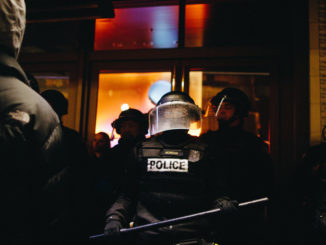
From Palestine to Colombia: The End of the White World Colonial-Capitalist Project?
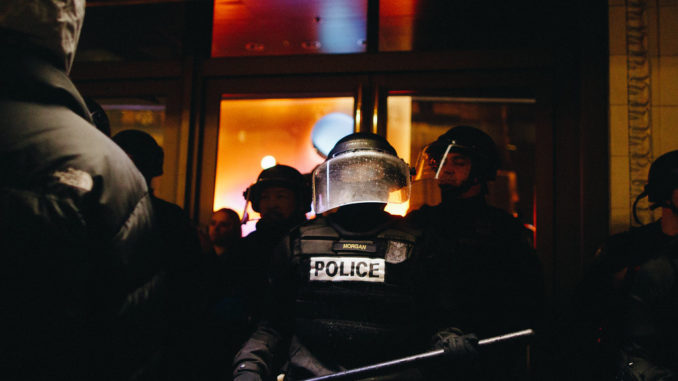
The world is shocked by the image of an 11-story residential building in Gaza collapsing because of a bomb dropped by the Israeli Defense Force, one of the most advanced armies in the world thanks to U.S. support. But in the United States, Andrew Yang, former presidential candidate and now candidate for mayor of New York City, proudly proclaims he stands with the “heroic people of Israel” who are under attack from the vicious, occupied Palestinians, who have no army, no rights and no state.
But as politically and morally contradictory as Yang’s sentiments might appear for many, the alternative world of Western liberalism has a different standard. In that world, liberals claim that all are equal with inalienable rights. But in practice, some lives are more equal and more valuable than others.
In the liberal world, Trump is condemned for attempting to reject the results of the election and indicating he might not leave office at the end of his term. But as soon as Biden occupied the White House, one of his first foreign policy decisions was to give the U.S.-imposed Haitian president, Jovenel Moïse, a green light to ignore the demands of the Haitian people and the end of his term in February. He remains in office.
In the liberal world, the United States that has backed every vicious right-wing dictator in the world since the Second World War, orchestrates coups, murders foreign leaders, attacks nations fighting for independence in places like Vietnam, trains torturers, brandishes nuclear bombs, has the longest-held political prisoners on the planet, is number one in global arms sales, imprisons more people than any other nation in the world, has supported apartheid South Africa and is supporting apartheid Israel—while championing human rights!
In the liberal world, the United States can openly train, fund, and back opposition parties and even determine who the leader of a nation should be, but react with moral outrage when supposedly Russian-connected entities buy $100,000 worth of Facebook ads commenting on “internal” political subjects related to the 2016 election.
In the liberal world, Democrats build on racist anti-China sentiments and the identification of China as a national threat, and then pretend they had nothing to do with the wave of anti-Asian racism and violence.
In the liberal world, liberals are morally superior and defend Black life as long as those lives are not in Haiti, Libya, Colombia, Venezuela, Brazil, all of Africa, and in the jails and prisons of the United States.
In the liberal world, you can—with a straight face—condemn the retaliatory rockets from Gaza, the burning of a police station in Minneapolis, attacks on property owned by corporations in oppressed and exploited communities, attacks on school children fighting back against police in Baltimore, and attacks on North Koreans arming themselves against a crazed, violent state that has already demonstrated—as it did with Libya—what it would do to a state that disarmed in the face of U.S. and European aggression.
And in the liberal world, Netanyahu is a democrat, the Palestinians are aggressors and Black workers did not die unnecessarily because the United States dismantled its already underdeveloped public health system.
What all of this is teaching the colonized world, together with the death and violence in Colombia, Haiti, Palestine and the rest of the colonized world, is that even though we know the Pan-European project is moribund, the colonial-capitalist West is prepared to sacrifice everything and everyone in order to maintain its global dominance, even if it means destroying the planet and everyone on it.
That is why Biden labels himself an “Atlanticist”—shorthand for a white supremacist. His task is to convince the European allies it is far better to work together than to allow themselves to be divided against the “barbarians” inside and at the doors of Europe and the United States.
The managers of the colonial-capitalist world understand the terms of struggle, and so should we. It must be clear to us that for the survival of collective humanity and the planet, we cannot allow uncontested power to remain in the hands of the global 1 percent. The painful truth for some is if global humanity is to live, the Pan-European white supremacist colonial-capitalist project must die.
This article was originally published in Black Agenda Report.
Ajamu Baraka is the national organizer of the Black Alliance for Peace and was the 2016 candidate for vice president on the Green Party ticket. Baraka serves on the Executive Committee of the U.S. Peace Council and leadership body of the United National Antiwar Coalition (UNAC). He is an editor and contributing columnist for the Black Agenda Report and contributing columnist for Counterpunch. He was awarded the U.S. Peace Memorial 2019 Peace Prize and the Serena Shirm award for uncompromised integrity in journalism.

U.S. and U.K. Green New Deals Skirt Around Systemic Transformation
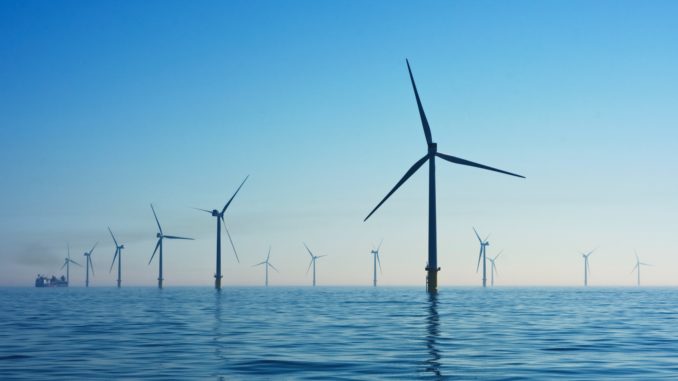
Record-breaking heat waves and economic hits as a result of the COVID-19 pandemic have prompted governments in the United States and the United Kingdom to consider enacting a Green New Deal (GND). But how might these GNDs play out? Will they curb emissions? More importantly, will they curb emissions while upholding the principles of social justice and equity?
In May 2021, Leon Sealey-Huggins, assistant professor in the global sustainable development division at the University of Warwick, wrote a detailed critique of GNDs, including those adopted by the U.S. Democrats and the U.K. Conservatives. Titled, “‘Deal or No Deal?’ Exploring the Potential, Limits and Potential Limits of Green New Deals,” the report calls for closer scrutiny. “GNDs that fail to address the fundamental questions of power, ownership and control will also fail to adequately ameliorate the injustices of climate breakdown,” the report stated.
GNDs also fail to address the need for drastic emissions reductions.
“Zero by 2050 is a global average target, and to be compatible with the principles of equity and justice under the Paris Agreement, rich nations have a responsibility to reduce emissions much more quickly than this, reaching zero by around 2030,” Jason Hickel, an economic anthropologist in Eswatini, the southern African country formerly known as Swaziland, told Toward Freedom. Hickel serves on the advisory board of the Green New Deal for Europe and on the Harvard-Lancet Commission on Reparations and Redistributive Justice. Hickel said GNDs need to include clear and explicit language on scaling down fossil fuels to zero, with binding annual targets.
“Right now, this language is totally absent,” he added.
Current Green New Deals Will Perpetuate Injustice
Max Ajl, an associated researcher with the Tunisian Observatory for Food Sovereignty and the Environment, said Sealey-Huggins’ critique is spot on. Ajl explained GNDs aim at “recolonizing the Third World through monocrop tree plantations, converting the Third World into biofuel plantations and other coercive mechanisms, rather than figuring out ways to reconstruct the United States and the European Union, so they remain socially complex, modern and industrial, but become sustainable, egalitarian and non-imperialist societies.” (“Third World” originally referred to developing states that did not align with the United States nor with the former Soviet Union. In this context, it refers to countries in the global South.) Ajl also is author of the recent book, A People’s Green New Deal.
Others, too, have expressed similar fears about further colonialism via GNDs. For instance, in a op-ed for Al Jazeera, Myriam Douo, a steering group member of Equinox
Initiative For Racial Justice, writes that by employing corporate solutions for climate change, the “EU’s Green Deal will entrench further European neocolonial practices.” Douo notes demand for metals such as nickel, cobalt and lithium has been driving labor abuses and environmental destruction. Such is the case in the cobalt mines of the Democratic Republic of the Congo and in lithium mines of Bolivia, Chile and Argentina.
The transition to clean energy requires metals like cobalt, copper, lithium, manganese, nickel and zinc for battery technology in electric vehicles, solar panels and wind turbines. A March 2021 report identified that about half the global supply of cobalt comes from the Democratic Republic of the Congo (DRC); over 80 percent of the global supply of lithium comes from Australia, Chile and Argentina; and 60 percent of the global supply of manganese comes from South Africa, China and Australia.
Between 2010 and 2020, a total of 276 allegations of human-rights abuses were identified in connection with companies that hold a majority-market share in clean energy minerals like cobalt, lithium and manganese, according to the Transition Minerals Tracker report released in February 2021.
Community impacts in the areas of health, violence and Indigenous rights constitute the biggest chunk of human-rights violations, while environmental impacts rank second. Pays to note that many of the countries that hold vast reserves of such minerals are already vulnerable—whether in terms of climate impacts or quality of human life in general.
Space for Improvement
Hickel noted that GNDs, as drafted, focus on emissions to the exclusion of resource use.
“We are overshooting a number of other planetary boundaries, which is being driven by excess resource use,” Hickel said. “Rich nations are overwhelmingly responsible for this problem, with per capita resource use vastly in excess of sustainable levels. The GNDs need to incorporate binding targets to reduce resource use.”
Ajl agreed. “The existing GNDs, including those from most progressives, are oriented to maintaining private control over the means of production, to ignoring climate debt, and to using materials-intensive technologies to solve what are often social more than technical problems,” Ajl said.
In the critique, Sealey-Huggins references versions of the GND Resolution, which the Biden administration might adopt. The resolution first was introduced in 2019 by U.S. Representative Alexandria Ocasio-Cortez (D-NY) and U.S. Senator Ed Markey (D-OR), both a part of the progressive wing of the Democratic Party. It cites itself as the first comprehensive plan in the United States that aims to tackle the scale of the climate crisis by recognizing deep-rooted economic inequalities. In April 2021, they re-introduced the legislation after it failed to advance in the Senate in 2019.
The GND resolution aims to achieve net-zero greenhouse gas emissions (GHGs) through a fair and just transition for all communities and workers. More specifically, it calls for actions like overhauling the transportation system, supporting family farming and investing in sustainable farming and land-use practices that increase soil health and restoring natural ecosystems. Biden’s plan for clean energy and environmental justice references the GND as “a crucial framework for meeting the climate challenges we face.”
But according to Ajl, even the original GND legislation progressives are promoting has its share of problems because it doesn’t do enough to fundamentally transform the system.
Sealey-Huggins too pointed out GNDs in the United States and the United Kingdom show a preference for highly technical, emissions-focused policies. And that by doing so, fail to democratize ownership and control via tools like social organization, redistribution and repair. He went even further to criticize roles adopted by institutions like the International Monetary Fund (IMF), which has conditioned aid on cuts to welfare services.
Sealey-Huggins suggests “reparative justice” as a path forward. That would involve global redistribution of power, wealth and resources; building grassroots power; and recognizing “shared goals” with movements led by the world’s Indigenous, African and oppressed peoples.
Rishika Pardikar is a freelance journalist in Bangalore, India.
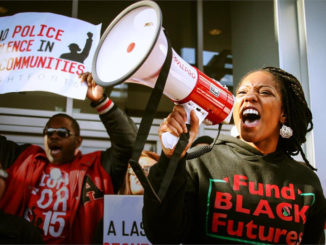
Film Review: ‘Unapologetic’ Examines Black Women’s and Black Queer People’s Activism
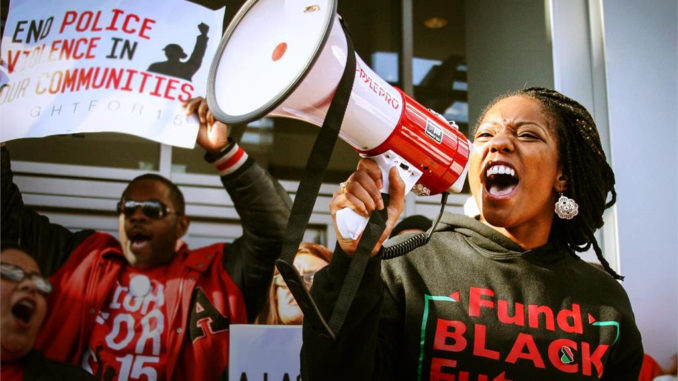
Ashley O’Shay’s documentary “Unapologetic” is an examination of the lives of Black women and queer activists in Chicago as they navigate the response in the streets to the police killings of Rekia Boyd in 2012 and Laquan McDonald in 2014. While the documentary provides a chilling revelation of just how long the process for “justice” for these two police killings took, it also, and perhaps more importantly, focuses on the struggles on multiple levels that the people who took to the streets and organized behind the scenes to demand that justice endured during that time. Two of those people are Janea Bonsu, an organizer with Black Youth Project 100 (BYP100), and Ambrell “Bella” Gambrell, a scholar and raptivist (a rapper who is involved in political or social activism).
After an introductory soliloquy in which viewers are let in on the meaning behind the film’s title, footage appears from a direct action in what looks to be a ritzy eatery in one of Chicago’s whiter areas. Agitators—and I use that term quite intentionally and with the utmost respect—interrupt the relaxed regular dining of the mostly white patrons with a coordinated call and response, indicting the dismissal of the suffering of poor Black families struggling to put food on their tables, who were probably not far from where the visibly uncomfortable white folks were sitting. They all sat there and chit-chatted over meals that were probably overpriced.
Though some of the patrons tried to appear patient and listen attentively, many more tried even harder to ignore the agitators and get on with their meal despite them, which is the perfect representation of the way much of white U.S. society responds to Black suffering and death in general. But the comments of the testy restaurant employee, dressed in what appears to be an elf costume—which makes his testiness all the more comical and infuriating—really bring home the point that the documentary endeavors to make, but also the point that the agitators were making.
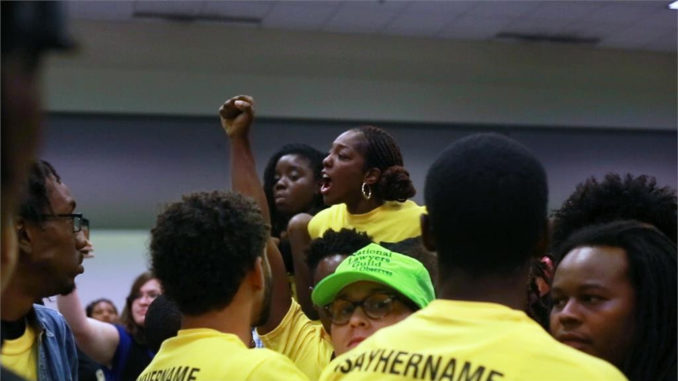
The documentary proceeds to follow Janae as she completes her doctoral dissertation while organizing with BYP100, and Ambrelle as she uses her talent as a rapper and her exposure to the criminal justice system through family incarceration as the foundation of her activism. One should not mistake the difference in these two women being one of class—both are residents of the Southside of Chicago, and both have attended and graduated college. The difference appears to be the paths each takes with that foundation that the documentary shows contributes to their organizing efforts in different ways. One pursuing a Ph.D. based on pursuing alternatives to the disastrous impact on Black women that social services and interactions with the police have. The other eschews pursuit of further education in the system that she excoriates in one of her poems recited at an early protest.
And this is one contradiction that the documentary raises, or should raise, among its audience regarding academia and organizing—how useful is academia in organizing? Because while Janae is clearly passionate about working to find solutions to the very real problems of the negative impacts of the social services system on Black women, can solutions be found inside the very systems that perpetuate those problems? There are already plenty of educated folks in the social work field and even in policing, many of them Black. When we see in the documentary how Janae’s doctoral chair counsels her that she doesn’t have to talk about everything in her dissertation, isn’t this a reflection of how the established institutions respond to Black people when we raise the alarms about that system and its impact on us? A question to ponder, but not with the aim of besmirching Janae’s pursuit of her Ph.D., because the contradiction isn’t one regarding personal choice, but it is about systemic realities and being realistic about them.
Conversely, rather than go the academic route, Ambrelle took to the streets in the pursuit of organizing her own space, especially on behalf of Black women—and particularly queer women—who have experienced victimization by the carceral state. Clearly a skilled wordsmith and masterful with rap technique, she also draws upon her own experiences with multiple generations of family exposure to incarceration, using the experience of her mother’s incarceration and then her brother—still incarcerated at the time of the making of the documentary—to help other Black women deal with the trauma of that systemic victimization.
Both women actually have experience with the carceral system impacting their families, and both connect the repression of the state as part of the “War on Drugs” to the ongoing war on Black and poor people, and how this repression destroyed the stability of even economically struggling Black communities like in the Southside of Chicago.
That both women highlight the need to elevate the voices of young, Black and queer women in the new efforts at organizing is a central theme in the documentary. The role women play in organizing—that has been too often overlooked throughout the historical reflection of the long fight for liberation for Black people—is an important and well-highlighted discussion that both women and others throughout the documentary raise. In organizing meetings and in the streets, the documentary points out several instances throughout when Black men literally take the mic from Black women while they were speaking or talk over them, thereby dominating the discussion. It seems the film focuses on the organizing that occurred after Rekia Boyd’s killing precisely because few outside of Chicago probably understood how much focus the people in the streets DID pay to her killing, despite people outside of Chicago saying that the movement writ large doesn’t pay much attention to Black women killed by police.
However, there are contradictions even in these discussions in the film, as Ambrelle particularly describes Black men as being only interested in their position to power and as oppressors of Black women. But even with this troubling discourse about Black men, other voices in the documentary point out other possibilities, chief among them that Black men who exhibit misogynistic behavior toward Black women are largely unconscious of how some of their behavior negatively impacts Black women because they, too, are oppressed and do not realize the depth of their oppression. Just as in the questions surrounding the utility of academia in the movement, raising this contradiction is not a dig on Ambrelle, but an occasion to examine how we all talk about Black men in the spaces we all occupy in the movement.
Those contradictions that we all must wrestle with aside, the documentary delves into the hectic, exhausting, emotionally taxing life of Black organizers, activists and agitators—whatever you want to call them. The work that is done to confront city councils that refuse to listen to the demands of the people most impacted by police violence that is literally funded by their tax dollars, the difficulty balancing organizing and personal lives, the importance of strong family ties and support, and the difficulties even pursuing romantic interests are all issues among several others that remind the viewer that organizing is not a hobby. Nor is it a lifestyle. It is—for many of us—our life, our whole life. And it is such because our lives depend on it. But as the two women show in the various ways that they stay connected and grounded when they are not organizing or agitating, the necessity of having those connections and making that time for them outside of organizing and agitating is critical to their survival, too.
The documentary also presents a detailed timeline of the response of the Chicago Police Oversight Board and the mayor’s office to the police killings of Boyd and McDonald. In that timeline, we see the way now-Mayor Lori Lightfoot conducted herself in the presence of these agitators as they demanded the cop who killed Rekia be fired, but also the cold detachment as Rekia’s brother testified before the Chicago Police Board that Lightfoot presided over as president.
Watching it, you wonder how in the hell did she get away with presenting herself as a progressive after the despicable way in which she responded to these incidents and the people in that community demanding action be taken against the cops who committed them. Lightfoot’s recorded comments from that time period, and those of Rahm Emanuel, are repulsive and one wonders how the hell Lightfoot was elected mayor after the revelations of her boss Rahm Emanuel’s attempts to cover up evidence of the McDonald killing and the corruption of the Chicago District Attorney’s Office that was connected to Emanuel’s shady dealings. The politics of identity divorced from class analysis and good ol’ Democratic lesser-evilism are at play here, but it is not pointed out in the documentary. That is unfortunate, because these issues are critical drivers behind continued political malaise and stagnation among the very community the agitators are agitating on behalf of.
“Unapologetic” is a much-needed exposé into the actual lives of actual activists. It reveals that the “people in the streets” are ordinary folks struggling with ordinary life, but they also have the extraordinary desire to challenge and change this system because, as Black women and Black queer people, they also struggle with the extraordinary burdens heaped upon them by this society. That seems to be the primary focus of the documentary, though it also looks at how those ordinary people are pushed to be unapologetic about their activism and agitation—and that is a good thing. However, it leaves out the deeper discussions we need to have about the gender relations between Black men and Black women, classism, and identity reductionism that exist within this important work, all of which we cannot afford to ignore if we ever want to be healthy enough—mentally, emotionally, and as a community—to endure this continued struggle.
Jacqueline Luqman is a radical activist based in Washington, D.C.; as well as co-founder of Luqman Nation, an independent Black media outlet that can be found on YouTube (here and here) and on Facebook; and co-host of Radio Sputnik’s “By Any Means Necessary.”
